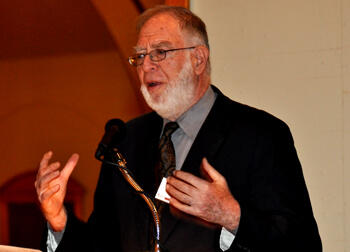Monroe E. Price
Monroe Price heads the University of Pennsylvania’s Center for Global Communication Studies at the Annenberg School for Communication. In that role he works with a wide transnational network of regulators, scholars, and practitioners in Europe, Africa, Latin America and Asia as well as in the United States. Earlier, Price founded the Programme in Comparative Media Law and Policy at Oxford University and remains a Research Fellow there. He also chairs the Center for Media and Communications Studies at Central European University. Price has served on the President’s Task Force on Telecommunications Policy and the Sloan Commission on Cable Communications (both in the 1970s) and on the Carter-Sagalaev Commission on Radio and Television Policy (in the 1990s). Price has also taught at UCLA, the Cardozo School of Law in New York City, and has visited at Cornell and the University of Sydney among other places. His most recent book
Owning the Olympics: Narratives of the New China (co-edited, 2008). Price is a fellow of the USC Center on Public Diplomacy. He contributed a number of Olympics-related entries to the
Huffington Post.
This video is also available on the USCI YouTube Channel.
Click on the play button above to view Monroe Price’s presentation on the Beijing Olympics.
The video presentation is of Monroe Price’s summary comments that concluded the USC conference on the impact of the 2008 Beijing Olympics. He also spoke at a private gathering prior to the conference. Amelia Arsenault summarized that talk for the USC Center on Public Diplomacy blog:
Price began his talk by reflecting on the work of Tamar Liebes, Elihu Katz and his co-editor Daniel Dayan (for the Owning the Olympics volume) on the concept of “media events.” These scholars have pinpointed how the rapid dissemination of communication platforms and the evolution of a 24-hour global news environment have helped to facilitate the rise of media events. Media events are broadly defined as events of national and/or international importance whose meaning is increasingly negotiated in the media sphere. These media spectacles generally surround a cause for celebration or mourning like a sporting contest, the death of a major figure, and/or the rise to power of a politician, and evolve into either mediated rituals of shame and degradation or rituals of celebration. As the oldest and most anticipated regularly international sporting event, the Olympic Games fit all the criteria for a global media event. They can emerge as dystopian nightmares, as was the case of Munich in 1972, or as celebratory events that serve the public diplomacy goals of the host nation.
According to Price, in the year preceding August 2008, or what he referred to as the “preparatory moment,” it remained uncertain which path the Chinese Olympics would follow. Would the Chinese government’s aggressive public diplomacy campaigns succeed? Would the Islamic separatist movement in China's far western region of Xinjiang successfully “hijack” media attention away from the games themselves? Or would human rights protestors successfully focus attention on China’s human rights record?
According to Price, up until the last two months it looked as if media coverage of the 2008 Olympic games would follow a dystopic narrative. All the signs where there. Politicians such as George Bush and Gordon Brown were reluctant to accept invitations to the opening ceremonies. President Sarkozy delivered several speeches critical of China. In response, Chinese citizens began a boycott of the French retailer, Carrefour. On numerous occasions, torch relay routes had to change due to protests and demonstrations. High profile actors called for a using the Olympics as a pressure point to encourage reform in Chinese relations with Tibet. Chinese citizens filed lawsuits filing against CNN for its bias; and Chinese students around the world protested unfair attacks against their homeland.
Ironically, according to Price, the same earthquakes that shattered China’s Sichuan province in May 2008 facilitated the creation of a unified utopian Chinese Olympics narrative: the “Earthquake Olympics.” The story immediately changed from controversy to redemption, solidarity, and sympathy. As Price put it, “in the face of catastrophe, wealth and power melt, so the story of China revert[ed] to one of struggle.” Acceptances to attend the opening ceremonies poured in. Boycotts quickly faded away. Major companies like Coca-Cola moved forward with marketing campaigns celebrating the unity, cultural connections, and the global Olympic spirit.
However, as Price cautions, while the earthquake preserved the Olympics as a utopian media event and a public diplomacy victory for China, it was not long after the closing ceremony that negative stories began to re-emerge. The Olympics was a moment of dreams, but “the nightmares would return. And they have moved from nightmares about toys and food to nightmares of economic leverage, economic failure and transnational economic dependence.”
Click here to return to the USC Beijing Olympics conference page.




